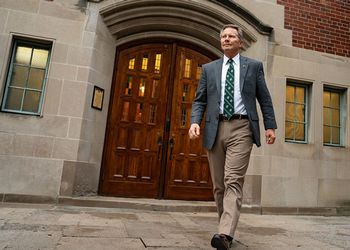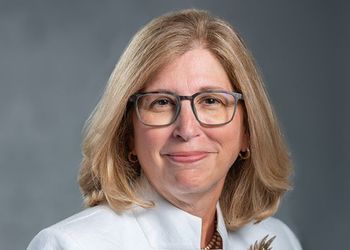Weaving a Safety Net for Students Without One: the FAME Program

They don’t call attention to themselves. They’re not interested in fanfare. They really just want to fit in. To thrive. And to be successful.
They are collegians who have either grown up in foster care, lived with relatives or friends in homes absent a biological parent or experienced homelessness as teenagers. Yet despite all of the uncertainties and obstacles in their lives, they’ve dedicated themselves to academic and career success.
About 400 Michigan State University students have identified themselves as having experienced these scenarios. MSU provides specialized support for those who wish to take advantage of it through its Fostering Academics Mentoring Excellence program, or FAME.
Overseen by the College of Social Science’s School of Social Work, FAME is the umbrella for an assortment of support services. Established in 2007, it boasts, among other assets, a network of passionate MSU volunteer advocates—called Campus Champions—embedded in such critical areas as admissions, financial aid, housing, tutoring, employment and counseling services.
FAME aims to be a bridge for its participants. Many of its students lack the safety net that a stable family can provide.
On average, 60 to 80 students annually avail themselves of FAME’s offerings. Participation is voluntary. FAME reaches out to potential participants through an introductory email.
Students can get financial help through MSU’s Spartan Advantage fund. Additional aid may come from Pell grants, loans, grants, state-paid stipends and salaries from student jobs.
FAME strives to ensure students’ tuition, fees and some books are paid for. Meanwhile, federal, state, university and alumni donations have and continue to support FAME.
The on-campus organization will also pair students with career mentors and life skills coaches if they wish. FAME holds social and leadership events. And a variety of advocacy opportunities exist. They include speaking presentations and internships at the Oregon-based FosterClub, a network for foster youth.
In 2012, FAME hired Andrea Martineau, its first full-time director, to keep things up and running, with the help of assistants and student interns. She is the primary point person for students seeking all sorts of assistance. At any time during the academic year, she may be a cheerleader, friend, coach and problem-solver—sometimes all in a day.
Martineau said many FAME students are drawn to careers in the fields of social work, public service, public policy, criminal justice and law. And most graduate with very little debt, she said.
Oftentimes, they’re the first in their families to attend college.
FAME is one of several statewide programs of its kind. They all collaborate under the umbrella of Fostering Success Michigan, an initiative to help foster youth make successful transitions to fulfilling careers and adulthood.
Below are the stories of three FAME students:
Angelica Cox,
Senior, James Madison College
I will never forget March 9, 2007. I remember vividly how the social worker looked me straight in the eye and uttered the words that would alter my entire childhood. That was the day that I was placed into the foster care system and separated from my parents.
To help escape the trauma in my life, I focused heavily on my academics. In 2013, I graduated from Caro High School with high honors and in the top ten of my class. After graduation, I received a letter from Michigan State University that told me that I qualified for the Spartan Advantage, which meant that a majority of my higher education was going to be paid for. This was a dream come true because I had always dreamed of coming to this university and now I could afford it.
When I transitioned to MSU, I still lacked the emotional, financial, or social support that a majority of my peers had. A few weeks before the start of the fall semester, I was couch surfing rather than living in the comfort of a stable home. I remember moving into my dorm my freshman year—I was alone.
It was hard coming to college all by myself, without a lifeline to parents or a home. The most challenging obstacle was to stay focused on my education because I also had to worry about other life issues—such as having somewhere to stay over college vacations, finding access to health insurance and simply discovering the inner strength to stay motivated.
When I arrived on campus, the FAME program reached out to me. Out of all of the generous contributions this organization made in my life, my most memorable experience was when the FAME program found a way to purchase health insurance for me. The FAME program’s kindness allowed me to realize that I did not have to fight this battle alone. This is one of the many contributions the organization has made to help support me.
Instead of letting my past drag me down, I have continued time and time again to take advantage of the opportunities at this university. Last summer, I completed a study abroad in South Africa and I was the Michigan FosterClub All-Star. Currently, I am a part-time staffer for Michigan State Rep. Andy Schor, which is preparing me for an internship this summer on Capitol Hill.
Fewer than 10 percent of U.S. foster youth graduate from college. Thanks to the support of the FAME program and MSU, I will be graduating in December. I hope to one day become a social work professor so I can share my knowledge on the child welfare system with the world.
Justin Jesse Mcelwee
Senior, James Madison College
I grew up in Flint with five brothers and a sister. We now range in age from 11 to 23 years old. My dad came from a very poor family and moved to Flint for work. My mom grew up in a middle-class family and had more education. I have to thank my parents for a lot. We did not live in the best area of town, but I still got a great education and I felt safe. My parents did everything they could for us.
When I was 14, just before the recession hit, all of us kids were abruptly taken from our home. I lived with family members for about a year. But, they weren’t able to commit to taking care of me.
I felt frustrated during that time. I entered the foster care system and ended up moving to several different cities and high schools across Michigan. I eventually realized I needed to be productive and consistent. During my senior year, I concentrated on my schoolwork, got involved in politics and played sports to redirect my energy.
My high school college counselor helped me apply to colleges. MSU was at the top of my list. My parents instilled in me the value of getting a quality education. After high school graduation, I got a job at McDonald’s for the summer and I attended Saginaw State University for a year. I had a mentor there and worked in the athletics office. About that time, other important adults came into my life, people I could trust and who were helping me because they cared about me.
My mentor had graduated from James Madison College. He was among the adults who encouraged me to visit East Lansing and to apply to MSU. I did. And I was accepted. Oh, man, the workload was intimidating. Plus, a student has to be mature enough to keep everything in check—mentally, socially, physically, emotionally and academically.
MSU’s FAME program gave me an awesome start. It helped me with financial aid and housing—and it helped me set goals. FAME also matched me with a mentor here who gives me good advice and teaches me life skills.
I am senior studying International Relations in James Madison College. I want to be a lawyer and/or earn my MBA. So far, I have interned at the State House, the Michigan Federation for Children and Families and the Michigan State Senate.
Two summers ago, I interned at the national headquarters of the Foster Care Club, a non-profit in Oregon that works on child welfare policies and programs for youth across the country.
I believe the foster care system is trying to help youth, but it’s largely failing in its mission to serve as a gateway to adulthood for teenagers. I’d like to help turn that around when I graduate in a year. The state of Michigan has done everything possible to help me be successful.
Kiara Marshall
Freshman, Residential College in the Arts and Humanities
Even though I had my mom and two younger brothers by my side, my childhood wasn’t the best. I grew up without my father, but that was something that I eventually got used to. I know my mom tried her best as a single parent, which is why I admired her. We didn’t always have shelter, food, or clothes. Even though we were eventually moved into foster care, I look back and say that we made the best of what we had.
At the age of 14, I had to accept the fact that my mother wasn’t going to get us back in her care. It was hard for me because I had faith in her and was hoping that she would overcome her addiction. As I got older, I understood that you couldn’t get rid of an addiction overnight.
I always wanted to go to college because I knew that it was my only way out. I wanted to get out of Detroit so bad and show people that I could make it. I am the only one on my mother’s side of the family to graduate from high school. I wanted to break the mold. When I was applying to colleges, I had people around me that helped me get into MSU. I’m truly thankful.
My first semester of college, I was so nervous because I didn’t know how I was going to handle it. I had been taking care of myself since I was 16 so being on my own wasn’t something that was new to me. I was worried about college life in general: the course load, making friends, joining clubs.
I’m an independent African-American student who came from Detroit, graduated from a Detroit Public School and somehow made it to MSU. Although I have been through a lot in my life, I would never want someone to pity me because there are other students who faced the same obstacles and have overcome them just as I did.
FAME is an excellent program and support system to provide students with resources and someone to talk to. I have met people who truly care about me and are continuing to help me transition into the world where I’m going to be standing as a true adult.
I want to be a social worker in foster care or adoption. After being a foster youth for almost seven years, I want to help other foster youth get what they deserve. I also want to open my own nonprofit organization for foster youth and people who age out of foster care.



